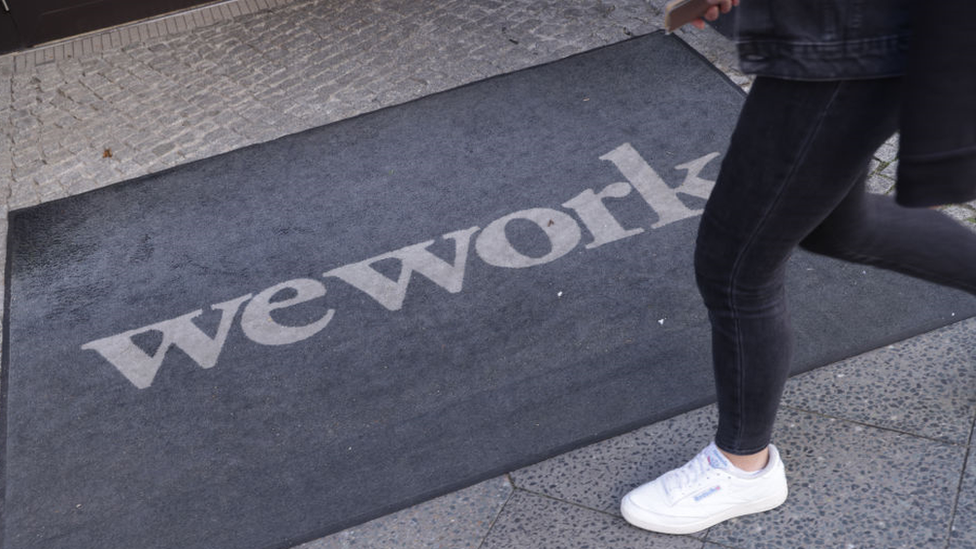WeWork: What went wrong for the much-hyped firm?
- Published

A WeWork office in Shanghai
WeWork was once hailed as the future of the office. But now there is "substantial doubt" about its future. What went wrong?
David Born, the head of Born Licensing, a small UK-based character and movie licensing business, became a WeWork tenant in London starting in 2018. At the beginning, he counted himself a major fan of the co-working firm.
"I loved the facilities, I loved the vibe, I loved having an office in a great location at an affordable price and I loved the ping pong as well," he says.
Then the pandemic hit - and he got comfortable working from home.
"Everything changed," he says. "I cancelled my membership as soon as possible."
You could be forgiven if you thought WeWork was already dead.
After all, the firm's disastrous 2019 attempt to sell shares to the public, which imploded after investors raised alarm about the company's massive losses and insider dealings, spawned a mini-genre of business obituaries chronicling the firm, including the Apple TV series WeCrashed.
They also mocked the ambition and incomplete comeuppance of co-founder Adam Neumann, who left the company disgraced - and a multi-billionaire.

WeWork inspired WeCrashed starring Anne Hathaway and Jared Leto as Rebekah and Adam Neumann
Then, a few months after the listing debacle, the pandemic hit, sparking a revolution in remote work and exposing WeWork to blistering public criticism from tenants looking to escape their leases.
"They offered no love in those circumstances," Mr Born notes.
And yet, somehow, the company kept operating - limping along, as executives sold off ancillary businesses, cut jobs and cancelled or modified hundreds of leases, trying desperately to stem the firm's losses before it ran out of money.
Two years ago, WeWork even managed the listing, raising $1.3bn from investors.
Now time may finally be up.
This month, the company, which was valued at roughly $47bn at its height in early 2019, formally told investors it was at risk of going out of business.
"When a company gets caught in the kind of death spiral that effectively began with the market's rejection [in 2019]... clearly that's hard to recover from," says Jeffrey Rayport, a faculty member at Harvard Business School, who has studied the firm.
Still, he says, the firm's fall is stunning: "It's a long way down, if zero is where we're going to wind up."

WeWork co-founder Adam Neumann (R) seen here with actor Ashton Kutcher
David Tolley, who was named interim boss this spring, told investors this month that the warning was a "technical accounting determination", which did not reflect the firm's plans for improvement.
But for those following the company, which still employs 3,700 people and controls some 600 locations in 33 countries, the writing was on the wall.
Two months earlier, three board members had abruptly quit, citing disagreements about strategy, and were replaced by bankruptcy experts.
Shares in the firm have been trading around 20 cents apiece since May.
Analysts said WeWork's past had spooked potential tenants and left it with massive debts, a hangover from its early decision to act like a big tech company and pursue an aggressive global expansion on the bet that profits would follow.
The firm had scooped up long-term leases in prime office space around the world, expecting to make money by sub-letting the space on a short-term basis to firms and individuals looking for flexibility and trendy digs.
But membership figures at the offices it controls have plateaued around 520,000 since 2019.
With occupancy rates hovering around 75%, it reported net losses of $2.3bn last year, after $4.6bn the year before.
"Ultimately, WeWork's issue has been its attempts to act like a tech start-up when it is fundamentally a property business," says Russ Shaw, founder of Tech London Advocates & Global Tech Advocates.

Is the writing on the wall for WeWork?
Meanwhile, the era of easy tech funding, fuelled by low interest rates, which allowed WeWork's spread has ended, says Claire Holubowskyj, senior research analyst at Enders Analysis, who said the firm now stands as "the poster child of overhyped start-up".
"It was able to grow because of that culture of really backing tech companies," she says. "That's changed now - the broader economy has shifted."
Whether WeWork's vision of the office as a space for entrepreneurial hustle fuelled by communal ping pong and kombucha - a vision which the firm memorably assured investors in 2019 would "elevate the world's consciousness" - is more sustainable remains to be seen.
Property firms have generally had a rough go of it since the pandemic, especially since a sharp rise in interest rates has dramatically altered their financial prospects.
But WeWork and its rivals say they are optimistic, arguing that uncertainty about property needs should spark more desire for flexible leases, not less.
IWG, which owns the Regus and Spaces brands, this month reported a 48% surge in profits for the first half of the year and said it was "cautiously optimistic" about the future.
"There's a huge opportunity for it. Unfortunately I think WeWork might have lost its way," says Teddy Kramer, a former director of new market development for WeWork who now runs his own co-working firm Neon.
Analysts warn that the business is risky because it is relatively easy to mimic, while requiring significant money to create and maintain offices with buzz. Earlier iterations have stumbled - including IWG, which sought bankruptcy protection for some parts of its business in 2020.
"People enjoy it. Doesn't mean it is a profitable business model though," says Russ Mould, investment director at AJ Bell.

David Born was once a loyal WeWork tenant. That changed in the pandemic
And many former clients - especially those still sour on the firm's pandemic-era negotiations - may simply not be coming back.
"I still believe in the shared workspace business model and it was very valuable to my business for the majority of the time," says David Born.
"[But] their behaviour during the pandemic was unforgivable, so even if my team did go back to a shared workspace I would go out of my way to ensure that it isn't a WeWork.
"However, given the deep financial trouble the company is in, I doubt it will exist for much longer. At least in its current form."
Additional reporting by Noor Nanji in London
- Published9 August 2023
